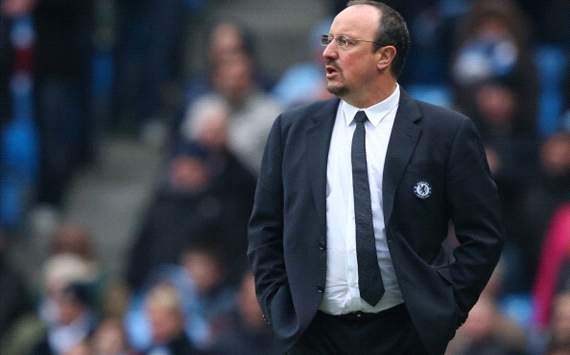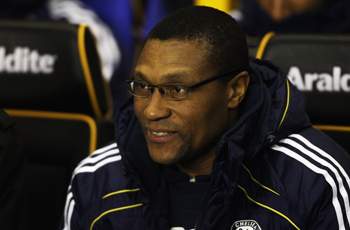
Benitez as expendable as Mourinho while Abramovich seeks a different kind of stability
March1, 2013
By Richard Offei-Addo Afeinyie,The News
Credit:goal.com
The Chelsea owner's model for success is
to weaken the power of the manager while surrounding him with backroom
staff who provide a smooth transition from one regime to the next
SPECIAL REPORTAs Rafael Benitez laid the foundations for further activity at Chelsea's managerial revolving door, scrutiny falls again on the club's coaching model.
The Spaniard all but sealed what is likely to be his ugly fate with a calculated criticism of the team's supporters and the man who deemed him a suitable replacement for Roberto Di Matteo following Wednesday's win over Middlesbrough.
During Roman Abramovich's decade-long reign, however, the first-team manager has always been expendable. Benitez's astonishing post-match tirade will have done nothing to persuade his employer that he is anything but.
Abramovich's stance is nothing new and is not regarded by the Russian owner or, indeed, the board who carry out his instructions, as unhealthy or counter-productive.
By contrast, Chelsea officials believe that the club's coaching set-up is stable and logical. To outsiders who only focus on the role of the manager, it does not look that way but insiders at the Cobham training base feel that the building blocks are in place for a smooth transition from one regime to another.
| THE COMPANY MEN |
 |
| TECHNICAL DIRECTOR |
| Michael Emenalo |
| ASSISTANT FIRST-TEAM COACH |
| Steve Holland |
| ASSISTANT FIRST-TEAM COACH |
| Bolo Zenden |
| ACADEMY MANAGER |
| Neil Bath |
| UNDER-21s MANAGER |
| Dermot Drummy |
| DIRECTOR OF FOOTBALL OPERATIONS |
| Mike Forde |
| SENIOR OPPOSITION SCOUT |
| Mike McGiven |
| GOALKEEPER COACH |
| Christophe Lollichon |
"This model is replicated around Europe and is likely to become more common in England in the future.
"Owners like Abramovich don't want the manager to be the main man at the club. They don't like the fact that he can have so much power over the football operation, for instance in the agents' fees spent on the players he wants.
"They want the manager to work alongside the sporting director or director of football, who they feel is their man. They know the head coach role is only dependent upon results and they don't see why that man should have too much power.
"The stability at Chelsea lies not in the dugout, like it does at Manchester United or Arsenal, but in the permanence of key members of the backroom staff."
Take assistant first-team coach Steve Holland, who joined Chelsea from Stoke City in August 2009 to manage the reserves before taking on a first-team coaching role two years later under Andre Villas-Boas.
Holland is known within the game as a highly regarded coach and has established himself as an important conduit beween the first team and the academy, as well as the first-team and technical director Michael Emenalo, who is regarded as Abramovich's eyes and ears at Cobham.
As someone who shares the No.2 duties with Bolo Zenden, Holland is part of Benitez's inner circle but partly removed from it, too. He knows that Abramovich does not like the coaches to get too close to the manager.
"Everyone is aware of what happened to Paul Clement," the source added of the former first-team coach who had been fast-tracked through the coaching set-up during his second spell at the club. "He got too close to Carlo Ancelotti and paid with his job when Carlo was dismissed."
Holland will most likely be working under his fourth manager in two years before too long but is a baby of the behind-the-scenes machinations compared to other influential members of the backroom staff.
Neil Bath joined Chelsea in 1993 and has managed the Academy since 2004. Under-21s manager Dermot Drummy joined the club from Arsenal in 2006. Director of football operations Mike Forde has been at Chelsea since 2007 and now sits on the board.
Other familiar faces at Cobham include senior opposition scout Mick McGiven, whose first Chelsea job was in 1990, and goalkeeper coach Christophe Lollichon, a close ally of Petr Cech first at Rennes and, then, in west London since 2007.
|
|
|
In England, there is a culture of the manager running the show, or at least being seen to run it through the medium of staged press conferences and match day touchline posturing.
The cult of the manager is all pervasive. As long as Ferguson and those who seek to imitate him, like David Moyes and Sam Allardyce, are around, the traditional view that the manager is god will be reinforced.
By tearing up such a well-thumbed script, the Chelsea model simultaneously weakens the powerbase of the manager, something which Benitez has found hard to accept, while strengthening the hand of the owner.
Yet Abramovich has a Champions League, three Premier League titles, four FA Cups and two League Cups to show for doing things his way.
He is painted as an impatient, ruthless owner who is as demanding as he is unforgiving of the man who picks the team.
But this Russian, by Premier League standards, is also a revolutionary.

No comments:
Post a Comment